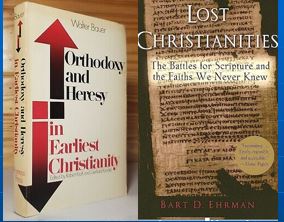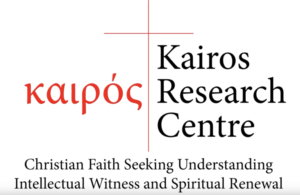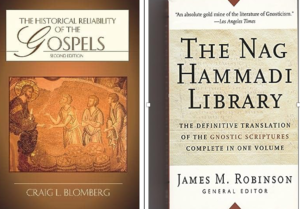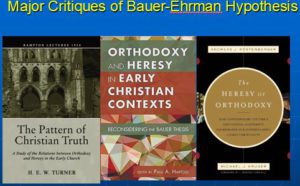 A. Bauer-Ehrman Revisionist History – “Heresy Preceded Orthodoxy”
A. Bauer-Ehrman Revisionist History – “Heresy Preceded Orthodoxy”
Ehrman’s assertion that the early Christians took liberty with scripture flows from his contested claim that there was no defining leadership in the early church. According to Ehrman, there was no notion of orthodoxy in early Christianity. Instead, a variety of “christianities” like the Ebionites, the Marcionites, the Gnostics and “proto-orthodoxy” [Ehrman’s coins the term “proto-orthodoxy” as he refuses to acknowledge that there was orthodoxy in early Christianity] vied for power and influence. Ehrman argues that alternative forms of “christianities” and their sacred writings which include the Gospel of Thomas, the Gospel of Mary and the Gospel of Peter should be regarded to be of equal authenticity (or in Ehrman’s real estimation, of equal inauthenticity) as the four canonical gospels. Indeed, he questions the special regard given the canonical gospels by orthodoxy since to him, the New Testament canon as it is, came to be only when the politically powerful “proto-orthodox” Christians in Rome unilaterally decided which book to be included in or excluded from Christian Scripture, and then applied ecclesiastical machinations and coercive policies to force other Christians to accept their decision. The other forms of “christianities” were then stigmatized by the victorious “proto-orthodox” party to be heretical and their writings were erased from history until some of them were discovered in Nag Hammadi in 1945. Ehrman writes, Continue reading “Bart Ehrman’s Historical Revisionism. Part 2/3. Relegating Orthodoxy in Early Christianity”

 Question: But critics like Elaine Pagels & Bart Ehrman argue that this traditional history of orthodoxy is skewed because it grants greater authority to the canonical gospels and ignores the other (gnostic ) gospels. Why do you think the canonical four gospels provide more accurate historical information about Jesus than the gnostic gospels?
Question: But critics like Elaine Pagels & Bart Ehrman argue that this traditional history of orthodoxy is skewed because it grants greater authority to the canonical gospels and ignores the other (gnostic ) gospels. Why do you think the canonical four gospels provide more accurate historical information about Jesus than the gnostic gospels? Question: Many secular university scholars argue that there was diversity of Christian beliefs in the early church as different sects competed with one another for influence. When the sect in Rome gained power it declared itself orthodox and condemned the other sects like Gnosticism to be heretical. What is your response?
Question: Many secular university scholars argue that there was diversity of Christian beliefs in the early church as different sects competed with one another for influence. When the sect in Rome gained power it declared itself orthodox and condemned the other sects like Gnosticism to be heretical. What is your response? A. Bauer-Ehrman Revisionist History – “Heresy Preceded Orthodoxy”
A. Bauer-Ehrman Revisionist History – “Heresy Preceded Orthodoxy”